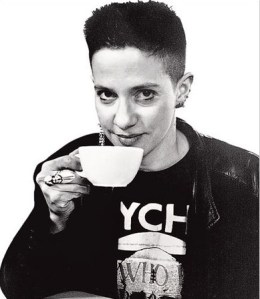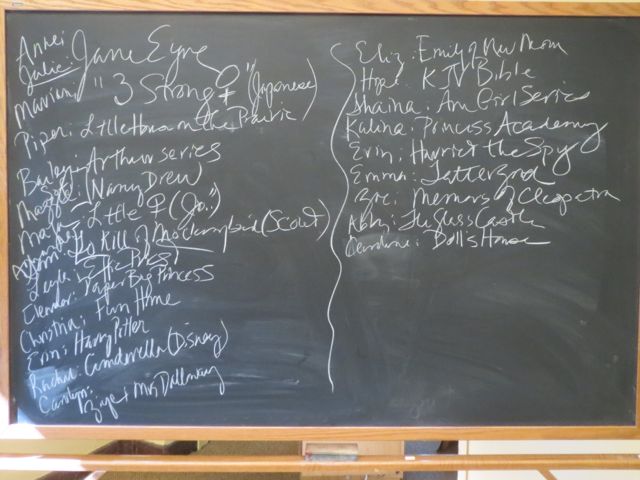Serendip is an independent site partnering with faculty at multiple colleges and universities around the world. Happy exploring!
Notes Towards Day2 (Thursday, 9/3): "Seeing Gender"

 |
[Remembering Kathy Acker: by Alan Ginsburg and Neil Gaiman]
I. Circle the chairs, then get up and introduce yourselves, by identifying your avatars…
II. welcome back!...who came back & who's new? (pass around checklist)
checking in re: Serendip accounts--how'd it go?
did everyone sign up? is everyone recognizable?
(needing backstories/explanations?)
who needs a hand up w/ this process?
other questions/obstacles/successes to report?
III. your weekend plans
by 5 p.m. on Sunday, post a comment to Our Course Forum about "seeing" or "working on" gender...
reflecting on what happened today/Tuesday (could also anticipate next week's discussion)
by classtime on Tuesday, work your way through the first 1/2 of
Kate Bornstein's New Gender Workbook: A Step-by-Step Guide to
Achieving World Peace Through Gender Anarchy and Sex Positivity
(I'll ask you to finish the workbook by Thursday, so you
might actually want to do the whole over the weekend...)
As you read the workbook, do the exercises
(that's why it's called a workbook!);
we will also do some of them together in class...
II. For today, I asked you both to look @ Rhea Ewing's Fine: A Comic About Gender,
and to read Kathy Acker's 8-pp. essay, ""Seeing Gender."
And we began to share, already, the books that have been important to us,
in understanding gender (ours, and the way the world divvies up this category).
I want us to say more about the patterns
(of princesses, of conventional gender roles)
we saw among our selections;

also about how important books have been,
in shaping our sense of sex-and-gender--
but I want us to turn first to visuals.
Let's do an exercise taken from Ewing's Comic about Gender.
She conducted interviews w/ people through the midwest, and
then represented them as comics
(abstracted, simplified, generalized...)
in order to encourage further conversation.
So, let's do this: get in pairs.
Ask/answer the same questions Ewing asked her subjects:
* In your own words, what is the difference between sex and gender?
* What gender do you consider yourself to be?
* How do you feel about terms and labels?
* Has anyone ever questioned your gender presentation?
While you are listening to your partner's answers,
draw something that represents them/one of their answers--
a simplification/an abstraction of their understanding of gender.
You will bring those sketches back to the large group.
Re-gather in large group, pass the images...and discuss:
how does gender present itself? what does it look like?
what is the difference between sex and gender?
How do we see ourselves in relation to those categories?
Joan Roughgarden: to a biologist,
male means making small gametes and female means making large ones;
these don't coincide w/ social criteria for man and woman:
the nearly universal gamete size binary does not imply
a corresponding binary in body type, behavior, life history--which is gender.
III. I suggested a second text for today, written rather than visual.
Let's turn to think together about what Kathy Acker's "Seeing Gender" adds to our understanding.
As a child, her complaint is about assigned social roles, the limits placed on her as a girl;
she found an alternative in books...about pirates! But she knew she couldn't become one...
As an adult, she performs a very elaborate reading
of 5 story-poems in Alice in Wonderland,
before arriving @ (what I see as) her key question:
"looking for the body which exists outside its patriarchal definitions,"
she asks, "What if language need not be mimetic?"
What might it mean to imagine that
"language has no discernible mimetic meaning"?
I don't know if that question even makes sense to you?
Let's see--
read aloud the final passage of her text:
"clear our forest water animals...so horny for"
Could gender lie here?
????????????????????????????????????
![]()
"We don't have a clue what it is to be male or female, or if there are intermediate genders. Male and female might be fields which overlap into androgyny or different kinds of sexual desires. But because we live in a Western, patriarchal world, we have very little chance of exploring these gender possibilities."
"Literature is that which denounces and slashes apart
the repressing machine at the level of the signified." (Acker)
What role does dreaming play in this imaginary?
What do you know of Irigaray, or of other "French feminists"?
![]()
Hélène Cixous, "The Laugh of the Medusa" (1975): Only then will the immense resources of the unconscious spring forth....to write...will tear her away from the superegoized structure....To write and thus to forge...the antilogos weapon."


